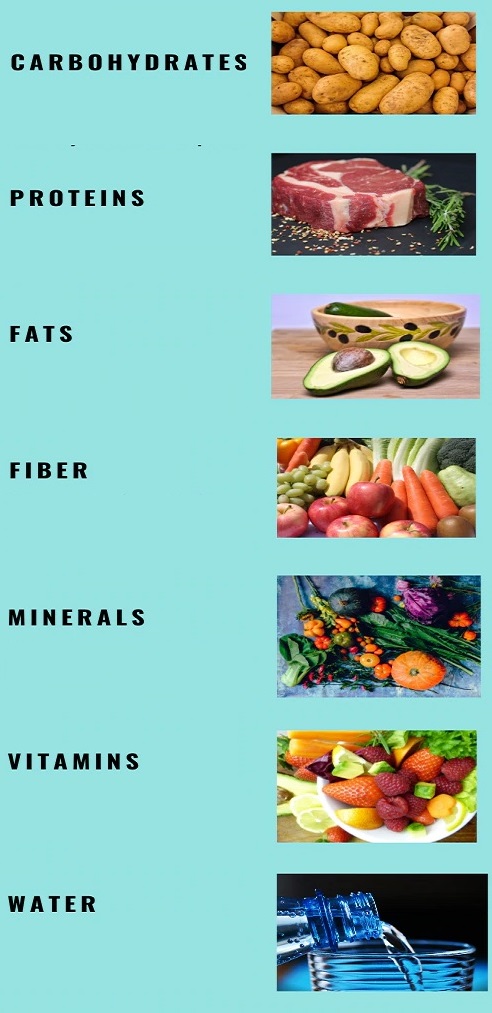The Nutrient Classes
The seven major classes of nutrients are protein, fat, carbohydrate, fiber, minerals, vitamins, and water.
 Carbohydrates, fat, and protein are macronutrients and provide energy. Water and fiber are also macronutrients but do not provide energy.
Carbohydrates, fat, and protein are macronutrients and provide energy. Water and fiber are also macronutrients but do not provide energy.
The macronutrients (excluding fiber and water) provide structural material (amino acids from which proteins are built, and lipids from which cell membranes and some signaling molecules are built), and energy.
Carbohydrates and proteins provide approximately 4 kcal of energy per gram, while fats provide 9 kcal per gram.
The micronutrients are minerals and vitamins. Vitamins are vital organic nutrients required in tiny amounts in the diet because they cannot be synthesized in sufficient quantities by the body.
Some nutrients can be stored – the fat-soluble vitamins – while others are required more or less continuously.
The body needs many minerals. They play important roles in the organism e.g. maintaining blood pressure, fluid & electrolyte balance, and bone health.
Poor health can be caused by a lack of required nutrients, or for some vitamins and minerals, too much of a required nutrient.
Essential nutrients cannot be synthesized by the body and must be obtained from food.
Protein is the most important component of the human body. Protein is composed of long chains of up to 20 different amino acids.
Nine amino acids are essential. This means they must be supplied with the food in sufficient amounts because they cannot be made in the body.
Protein is an essential nutrient, without which we cannot survive.
By breaking down existing protein, some glucose can be produced internally; the remaining amino acids are discarded, primarily as urea in urine.
This occurs naturally when atrophy takes place, or during periods of starvation.
Fats are triglycerides, made of fatty acids bound to glycerol. Some fatty acids, but not all, are essential in the diet: they cannot be synthesized in the body.
Body fat stores energy and insulates against cold. Fat is also an important constituent of the brain and nerves, but most importantly it is part of the membrane of all cells.
Cholesterol is a special fat, which is produced in the body where it is a precursor for important molecules such as bile acids, steroid hormones, sex hormones, and vitamin D, which are necessary for good health!
Carbohydrate ranges from simple monosaccharides (glucose, fructose, galactose) to complex polysaccharides (glycogen and starch).
The body uses carbohydrates as fuel, especially in the muscles, heart, and brain.
Some of the amino acids can be metabolized to glucose and can be used for energy production just as ordinary glucose, in the process known as gluconeogenesis. For this reason, carbohydrate is not an essential nutrient.
Vitamins, minerals, fiber, and water do not provide energy but are required for other reasons.
Fiber (i.e., nondigestible material such as cellulose) seems to be required, for both mechanical and biochemical reasons.
For all age groups, males on average need to consume higher amounts of macronutrients than females. In general, intakes increase with age until the second or third decade of life.
About 65% of our body is water, so water is essential for our health and well-being. Water serves as a solvent for most bodily components being the fluid in which almost all biological processes take place.


